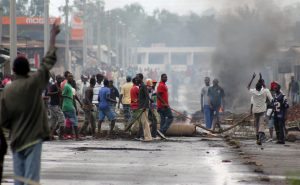Protests and Failure of Governments in Africa
This article is written by Hendrix NKAMICANIYE Hendrix, ASFL Local Coordinator in Burundi.
In recent years, the African continent has recorded a number of large-scale protests, but unlike the surge of protests in the 1980’s and 1990’s which were largely pro-democracy movements against autocratic governments, the recent uprisings are largely an overt demand for public scrutiny and accountability in the internal affairs of the countries.
The notion that democracy is the best form of government got assimilated quite fairly in Africa in the 1990s since it protects the human rights of citizens and stands for the will of the people. But today, many countries remain undemocratic and authoritarian. African citizens of the time believed democracy would help them get rid of corrupt leaders and guarantee individual freedom and political liberty but that has not been the case.
New trends of citizen protests are increasing in sub-Saharan Africa, usually in form of civic activism to challenge political decisions. Civil societies, opposition leaders and youth-based movements driven by political or economic concerns are mobilizing the people on the streets. Through the social media and new technologies, local civil societies and political activists have been able to mobilize and hold large gatherings. Many of the protests have been triggered by the extension of presidential terms and others were sparked by economic hardship. While some succeeded, others failed.
The case in point, in January, 2012 in Senegal, when then president Abdoulaye Wade announced his candidacy to stand for another term, protests erupted in Dakar, which eventually made him end his ambition to re-run for the office. In October, 2014, mass demonstrations broke out in Ougadougou against the will of the then president to extend his rule; this eventually led to his resignation. In September, 2016, in Gabon when the sitting President was declared as the winner, Libreville became a scene of deadly protests
In most cases, demonstrations failed like in Burundi and consequently, local governments opted not to make political concessions. It is significant to note that though primary triggers were country-specific, largely due to political misunderstandings, there were also economic undertones, such as unemployment and poor quality of life. For example, in July 2014, Ghana witnessed the uprisings against high cost of living and in South Africa anti-corruption marches took place, demanding accountability due to several corruption scandals.
Unlike the Arab spring in 2011which succeeded in North Africa, the Black Spring failed, always starting with big numbers over a period, but fading in after some weeks and life goes on except for a little cyber-activism by a few. This contagion of protests whether politically or economically driven, have some analogies, the participants were always the same (civil societies, opposition, youths, and women associations). Unlike the occupying movements and Arab spring, the marchers aimed to occupy public squares but ended up in violent outbreaks between the protesters and the police.
The protesters and local authorities saw this movement through different lenses: the latter branded the protesters as foreign agents, while the former described themselves as the agents of the rule of law and social justice. One may wonder if this contagion will get the cure soon or if it will not be a variation of another real-life infectious disease of anti-corruption tide we see in places like Guatemala, South Korea, Malaysia, Ukraine and recently in Romania. It is apparent that a new form of democracy called Monitory Democracy is emerging in this 21st Century, which will likely define a new relationship between the governors and the governed. It is high time African governments implemented anti-corruption policies to address acute corruption which often motivate violent erruptions and mass protests by regular citizens. By promoting good governance, transparency & accountability, respect for human rights and rule of law, citizens will be calm, there will be improved confidence in African economies which will lead to overall development.
This piece expresses the opinion of the author and not necessarily that of the organization. Students For Liberty is committed to facilitating a broad dialogue for liberty, representing a variety of opinions.

